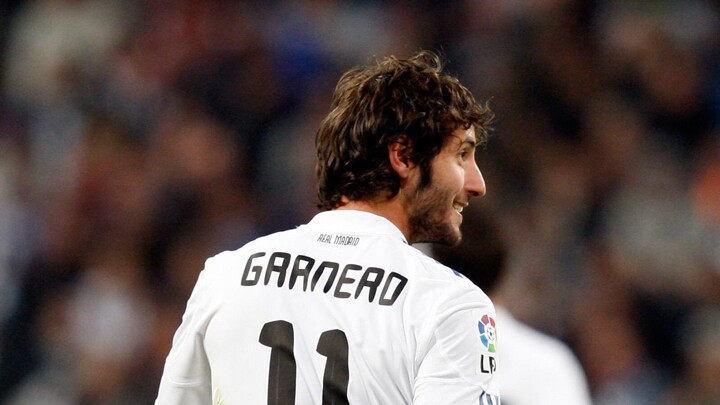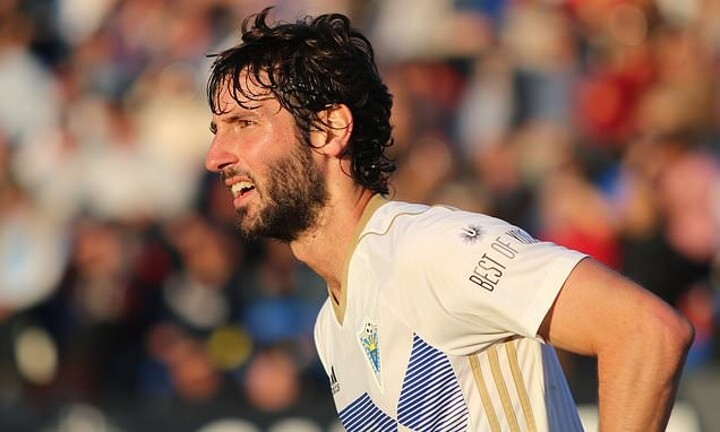As post-football careers go few will ever be able to top Esteban Granero. He was once an elegant midfielder who turned out for Jose Mourinho at Real Madrid, David Moyes at Real Sociedad, and Harry Redknapp at Queens Park Rangers.

But now, as his career winds down at Spanish third division club Marbella, he finds himself in the fight against the pandemic, trying to help the scientific community reduce the impact of the coronavirus.
Five years ago he set up an artificial intelligence company, Olocip, with scientists Pedro Larranaga and Concha Bielza.
The original aim was to provide clubs with data that would help them predict with greater accuracy how new signings would turn out.
Granero says: 'In my career I saw the quantity of information that was gathered, and I saw that the analysis of it was pretty d

eficient.
'I thought that there was a way that we could do an analysis that was not solely descriptive but also predictive.
'There is a principle error in descriptive analysis which is that if I'm looking at a player to sign I am not so interested in what he did last year at his club I want to know how he will he work here?
'If that player comes here in different circumstances, with different players and a different manager, what performance can we expect from him?
'I don't want to know his statistics from the last year, maybe in the second division in Germany but what stats I can expect from him next year in my context.'
So how did a football analysis service turn its attention to tracking the progress of the coronavirus?
'I got a call from a friend of mine who had created a platform called 'Stop Corona',' he says.
'He wanted us to get involved to help with the prediction of the evolution of the virus. We thought we had the tools to be able to do it well, and that it was our responsibility to contribute in the best way we could.
'We have a model that predicts the number of cases and measures the contagion in Spain regionally and nationally.'
Granero believes the value of these predictions is that they can accurately analyse beyond the pointers offered by official statistics.

He says: 'When there is such an evident shortfall in the number of tests. And when there are so many people who have caught the virus who haven't had the test, the official numbers are not the real numbers of the contagion – and that's something that can be estimated mathematically with a model like ours.
'Knowing the real number of cases and tracking the evolution of those numbers allows us to anticipate potential problems in the mobilisation of resources and it can also simulate the distancing and lockdown measures that can impact on the curve. By predicting movements and trends it can try to prevent a second wave.'
The 32-year-old started the work when the state of emergency was declared in Spain on March 13.
'If we had been working on it sooner, probably, we would have realised earlier that the sooner the state of emergency had been declared the better it would have been,' he says.
'The curve would have been lower and smaller and recovery would have happened sooner. That's something that has happened in countries all over the world, not just in Spain.
'But there have been countries that have anticipated this using artificial intelligence. In Canada they predicted that the epidemic could have a far greater impact than some believed – and that allowed them to get ahead of it and take measures before others.'
By the same token he argues that had governments waited even longer the consequences would have been far worse.
'If the state of emergency had been two weeks later, the dimension of the catastrophe would have been unimaginable. It doesn't bare thinking about,' he says.
Olocip publish their analysis every day on the website stopcorona.es and Granero is guardedly optimistic about the future. 'The curve is clearly downward now,' he says. 'We think at the end of the month, the start of May, the curve of cases of the contracted virus will be very low and that we will be able to confront this situation with more optimism.'
Such declarations come with a degree of responsibility but Granero says he feels no pressure because of how much he trusts the expertise of the scientists he is working with.
'We're not playing with this data,' he says. 'These are prestigious scientists. The data we provide is treated and analysed by doctors, epidemiologist and mathematicians. We're not taking decisions; we can't take decisions; what we can do is ensure that the model is absolutely reliable on the evolution of the virus.
'The medical staff are the heroes here putting themselves on the line every day. The least we can do is put ourselves at their disposal, giving what we can.'
And when the time comes to go back to concentrating on football Granero says Olocip will be ready to do that.
'Everything a player does on the pitch is susceptible to being converted into data,' he says. 'Practically everything a player does can be measured. The question is what that information is for.
'Do we want to know what has happened and only that? Or do we want to be able to use that data to anticipate what will happen in the future and to be better prepared?
